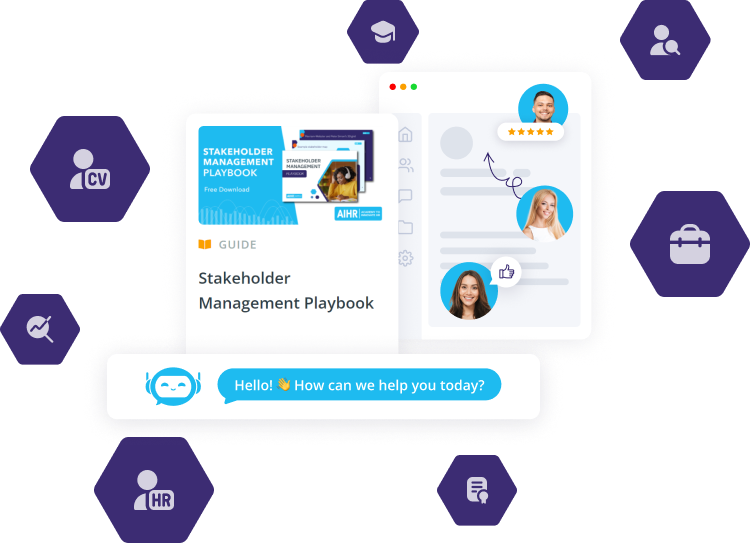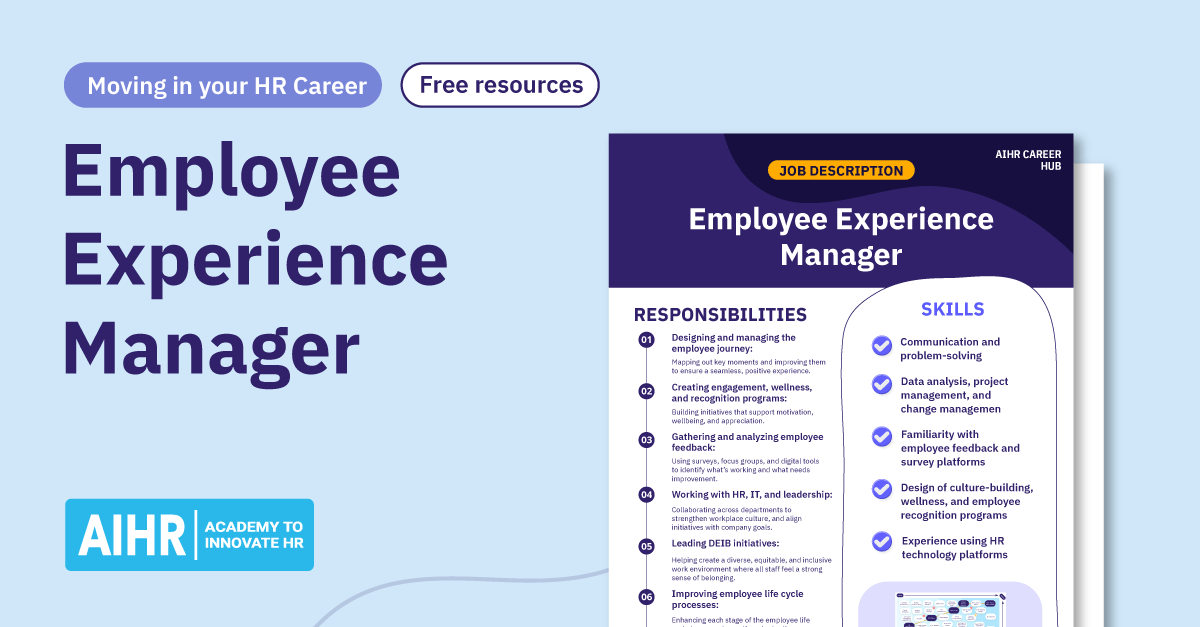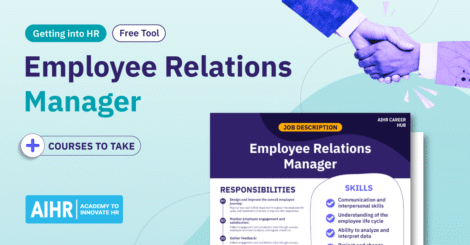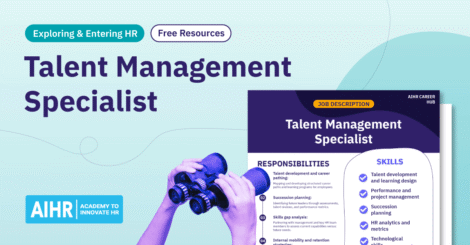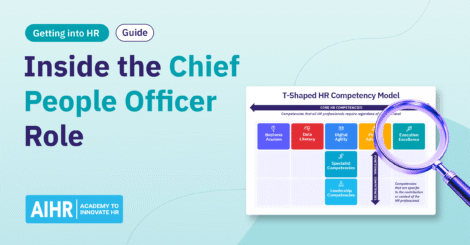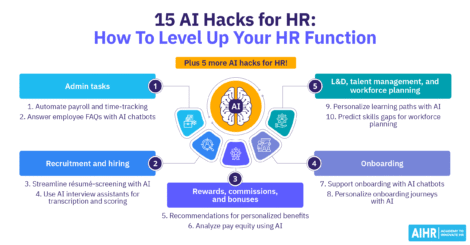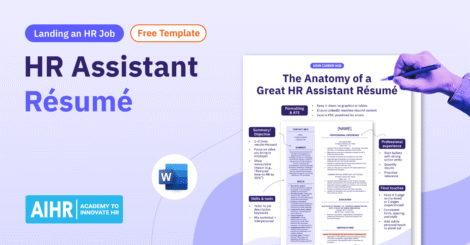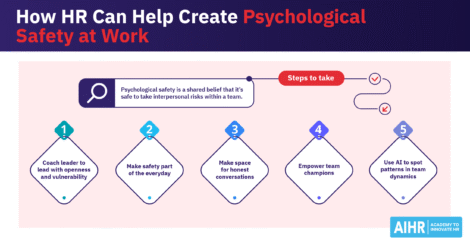Employee Experience (EX) Managers are critical to ensuring a positive employee experience. In fact, employees with positive workplace experiences are 68% less likely to consider leaving their jobs. Additionally, organizations that measure and manage experience and engagement typically achieve higher satisfaction and retention rates.
This article explains what an EX Manager does, their importance, the skills and qualifications a good EX Manager needs, and potential career paths for those in this role.
Contents
What is an Employee Experience Manager?
What does an Employee Experience Manager do?
Required qualifications and skills
The importance of Employee Experience Managers
Average Employee Experience Manager salary
AIHR certificate programs to take
What is an Employee Experience Manager?
An EX Manager is a modern HR role focused on improving the entire employee journey, from hiring to exit. Usually part of HR, people and culture, or employee engagement teams, EX Managers design and run programs that boost employee satisfaction, engagement, wellbeing, and productivity.
Their role goes beyond that of an Engagement Manager, who typically handles surveys, communications, and motivational programs. EX Managers take a broader view, shaping every touchpoint in the employee life cycle — from tools and systems to workplace environments — to ensure meaningful interactions aligned with business goals.
EX Managers often report to the Chief People Officer or similar leaders. They work across HR, IT (for digital tools), facilities (for physical spaces), internal communications, and leadership. This cross-functional role allows them to advocate for employees while influencing wider business decisions.
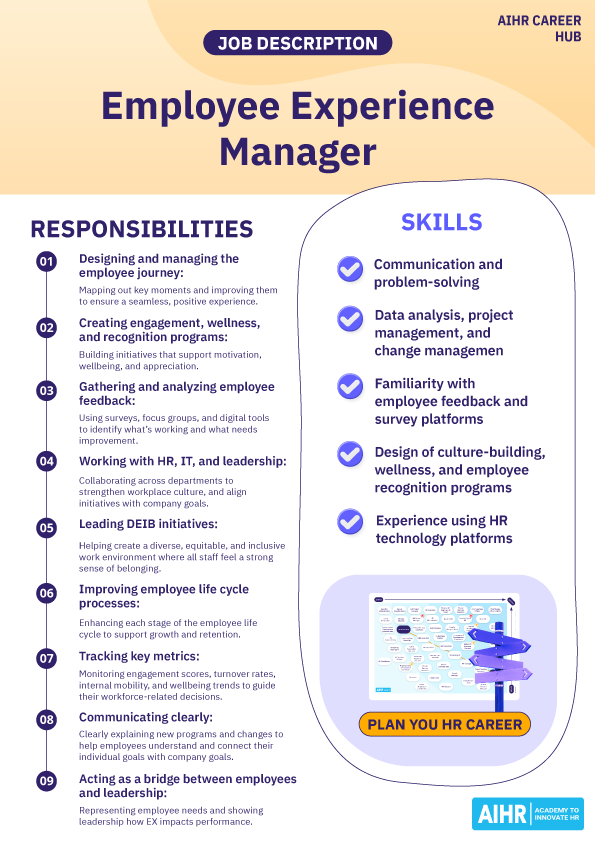
What does an Employee Experience Manager do?
An EX Manager designs and improves how employees experience their workplace — from when they apply to when they leave. Their job is to make the entire employee journey smoother, more engaging, and aligned with business goals. They focus on culture, communication, wellbeing, and career growth to help people thrive at work and stay longer.
Technology is central to the role. Platforms like Culture Amp, Qualtrics’ EmployeeXM, Microsoft Viva, and ServiceNow help EX Managers collect feedback, personalize experiences, automate communications, and streamline onboarding.
As employee expectations change, EX Managers must stay ahead of trends like hybrid work, tailored experiences, and predictive analytics to flag and fix engagement risks early. In fact, organizations that use tech to personalize EX see up to 21% higher productivity and 23% greater engagement.
Employee Experience Manager job description
An EX Manager is responsible for shaping the full employee experience across all touchpoints. This includes:
- Designing and managing the employee journey: They map out key moments — from onboarding to exit — and improve them to ensure a seamless, positive experience.
- Creating engagement, wellness, and recognition programs: EX Managers build initiatives that support motivation, wellbeing, and appreciation.
- Gathering and analyzing employee feedback: Using surveys, focus groups, and digital tools, they identify what’s working and what needs improvement.
- Working with HR, IT, and leadership: EX Managers collaborate across departments to strengthen workplace culture and align initiatives with company goals.
- Leading DEIB initiatives: They help create a diverse, equitable, and inclusive work environment where all employees feel a strong sense of belonging.
- Improving life cycle processes: From onboarding and internal mobility to development and exit interviews, EX Managers enhance each stage to support growth and retention.
- Tracking key metrics: They monitor engagement scores, turnover rates, internal mobility, and wellbeing trends to help guide their workforce-related decisions.
- Communicating clearly: EX Managers clearly explain new programs and changes, helping employees understand and connect their individual goals with company goals.
- Acting as a bridge between employees and leadership: They represent employee needs and show leadership how employee experience impacts performance.
- Staying current with trends: EX Managers keep up with tools, technologies, and practices to continuously improve the employee experience.
Build your skills in optimizing the employee experience
To boost retention, engagement, business performance, and your employer brand, optimize the employee experience through the use of design thinking.
✅ Apply design thinking principles to create user-centered employee experiences
✅ Understand how employee experience influences business performance
✅ Define your EX mandate to set the tone for your broader EX strategy
✅ Create an effective EX strategy aligned with HR and organizational strategy
🎓 Future-proof your HR function with a flexible, online Digital HR 2.0 Certificate Program.
Required qualifications and skills
Commonly required qualifications and skills for an EX Manager include:
- A Bachelor’s degree in Human Resources, Business Administration, Psychology, Organizational Development, or a related field
- Proven experience in HR, employee engagement, internal communications, or a similar people-focused role
- Strong interpersonal and communication skills to build trust
- Data analysis and familiarity with employee feedback and survey platforms
- Solid understanding of the employee life cycle, engagement strategies, and workplace culture enhancement
- Ability to design, implement, and manage culture-building, wellness, and employee recognition programs
- Proficiency in project and change management, leading initiatives from concept to completion
- Experience using HR technology platforms like Workday, SAP SuccessFactors, or equivalent systems
- Demonstrated empathy, strong problem-solving skills, and a people-first mindset in addressing employee needs
- Ability to stay current on trends in employee experience, engagement, wellbeing, and organizational culture.
In addition to these core qualifications, EX Managers must demonstrate digital fluency. Understanding digital workplace platforms, experience management software, and data visualization tools has become essential as employee experience strategies shift towards technology-enabled, personalized approaches.
Successful EX Managers must not only be skilled in traditional HR practices but must also excel at using data-driven insights to personalize and continually enhance the employee experience.
HR career tip
HR professionals who embrace their role within the people management function are being increasingly recognized as strategic partners in their companies. In fact, organizations that focus on people development and financial performance are four times as likely to outperform their competitors financially, and 1.5 times as likely to remain top-tier year over year.
The importance of Employee Experience Managers
EX Managers influence how employees feel about their work, team, and organization. Their impact spans multiple areas that directly affect business success, such as:
Employee engagement, productivity, and retention
By designing meaningful and supportive experiences, EX Managers help employees feel more connected to their work and teams. Higher engagement leads to improved productivity, stronger performance, and greater commitment, reducing the risk of an organization losing talented staff.
Strong workplace reputation that attracts top talent
A positive employee experience helps build a strong employer brand. As such, organizations that treat their employees well tend to attract top candidates, giving them a competitive advantage over their competitors regarding talent acquisition.
Company culture and internal communication
By improving internal communication and ensuring employees feel heard, EX Managers build environments where collaboration, transparency, and trust thrive. Meeting employees’ functional and emotional needs can, for example, significantly reduce attrition and strengthen company culture.
Reduced turnover and costs
Turnover is costly, both financially and operationally. EX Managers address the causes of dissatisfaction and disengagement, helping lower attrition rates and minimize recruiting, onboarding, and training costs. Companies that actively manage EX see a 24% lower turnover rate, leading to substantial cost savings.
Aligning employee needs with business strategy
By integrating employee needs with organizational strategy, EX Managers create a better-equipped, more motivated workforce. According to McKinsey, aligning employee experience with organizational strategy is critical for driving long-term business success.
Employee wellbeing and satisfaction
EX Managers prioritize programs that support mental health, physical wellbeing, and work-life balance, creating a healthier and more resilient workforce. A focus on wellbeing contributes to employee satisfaction and performance.
Continuous improvement through feedback and data insights
Through surveys, feedback tools, and engagement analytics, EX Managers provide insights into what’s working and what’s not. This ensures the employee experience evolves alongside organizational needs and employee expectations. Regular, structured feedback collection and data-driven improvement cycles can also sustain a competitive, engaging workplace.
HR career tip
The ability to craft and communicate compelling stories about employee experience initiatives can set your organization apart. Great HR leaders don’t just present data — they connect emotionally with stakeholders, advocating change to inspire action and long-term buy-in.
Average Employee Experience Manager salary
EX Manager salaries in the U.S. vary based on experience, company size, industry, and location. According to Salary.com, an EX Manager earns an average annual salary of $116,590, with most professionals earning between $101,090 and $130,190. Glassdoor reports an average salary of $99,227, while Indeed indicates an average annual salary of $88,787, ranging between $52,965 and $148,834.
AIHR certificate programs to take
If you want to enhance and build your expertise in digital transformation and inclusive leadership to future-proof your skills as an EX Manager, consider the following AIHR certificate programs:
- Digital HR 2.0 Certificate Program: This program equips you with skills to lead digital transformations, apply design thinking methodologies, and automate HR processes.
- Diversity, Equity, Inclusion & Belonging Certificate Program: This program teaches you to identify and remove unconscious bias, communicate with diverse groups, and drive cultural change to promote DEIB.
To sum up
By creating inclusive, supportive employee journeys, EX Managers drive engagement and retention, and foster greater innovation, collaboration, and business resilience. This gives organizations a powerful competitive advantage over their peers.
As the future of work continues to shift, organizations that invest in holistic, data-driven employee experience strategies, as well as the professionals who lead them, will stand out. EX Managers who combine digital fluency, cross-functional collaboration, empathy, and strategic thinking will build stronger workplaces, and meaningful, impactful HR careers for themselves.


